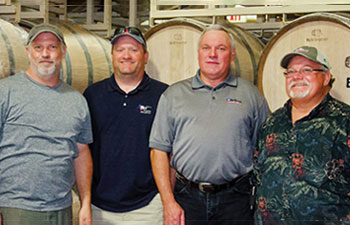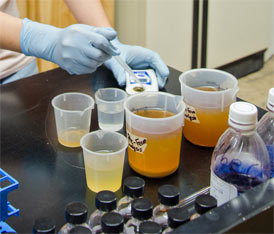
Photos by Sheryl Smith-Rodgers
Left to right: TCWW owners Mike Sipowicz and Dusty Timmons, AgTexas Regional President Gary Jones, and TCWW owner and grape grower Jet Wilmeth.
Golden rays of sunlight are breaking the early morning sky when a truck hauling a trailerload of freshly harvested Riesling grapes pulls up to the unloading dock at Texas Custom Wine Works (TCWW). It’s late August, smack in the middle of grape harvest season, and the company has been working around the clock to crush wine grapes delivered overnight from vineyards across West Texas.
But this winery, located on the fringe of Brownfield, is not like others in Texas — it doesn’t produce wines under its own label.
Rather, as the first custom crushing facility in the South, Texas Custom Wine Works is a service winery to other wineries, vineyards and winemakers throughout the state and beyond.
Like many successful businesses, TCWW was started to serve a need — in this case, the need for more grape-crushing capacity in Texas, the nation’s fifth-largest wine-making state.
Bumper Crop Creates a Dilemma
When you’re harvesting wine grapes, every hour counts. If the grapes are not picked and crushed when sugar and acid levels are precisely balanced, the juice can be ruined and thousands of dollars lost.
Thus it’s understandable that grape grower Jeter “Jet” Wilmeth panicked when he harvested more fruit at his Diamante Doble Vineyards in 2010 than his customers required.
“In 2010, I had a perishable crop,” recalls Wilmeth, who farms on the High Plains in Terry County south of Lubbock, Texas. “I didn’t know what to do! After I calmed down, I went down my list of Texas winemakers and started making phone calls.”
Ultimately, Wilmeth did sell and haul his surplus grapes to buyers.
“But afterward, I kept wondering, what if that happens again?” he says. “I needed a way to turn my perishable grapes into a form that had a shelf life. I thought about purchasing my own grape-crushing facility. But I realized I couldn’t make one pay because it’d only be open for three months out of the year.”
A Team of Experts
For help, Wilmeth turned to the Texas A&M AgriLife Extension Service. There he talked with Mike Sipowicz, state enologist, and Dusty Timmons, Extension viticulture advisor for the High Plains American Viticultural Area, a designated growing region that produces more than half of the state’s wine grapes.
“When Jet came to us for advice, we asked him to hold off,” Timmons says. “The state legislature in 2011 was making huge budget cuts, and funding for our programs got slashed. Mike and I, along with another colleague, had already been planning to start a custom winery similar to one in California that Mike had worked for earlier in his career.”
The third wine specialist was Dr. Steve Talcott, associate professor of food chemistry at Texas A&M University in College Station. With Wilmeth on board as another co-owner, the four men agreed to form a partnership and turn their idea of a service winery into reality.
“By combining our knowledge, we wanted to serve the Texas wine industry by filling in gaps and lowering the cost of entry into the market,” Talcott explains.
In March 2013, the foursome opened Texas Custom Wine Works — financed by AgTexas Farm Credit Services and buoyed with economic incentives awarded by the Brownfield Industrial Development Corporation.
“Jet Wilmeth, who’s been a longtime customer with us, is a visionary who’s always looked for ways to better use his resources,” says Gary Jones, regional vice president of lending services with AgTexas, which has backed local grape growers for many years. “It just made economic sense for AgTexas to partner with him in a venture that gives him the ability to add value to his grapes and control his product.”
More than a custom crushing and winemaking facility, TCWW also offers related services, including planting and vineyard management, winemaking consultations, custom label designing, advertising and marketing, and even laboratory testing.
Fastest Growing Winery
During extra busy times, Sipowicz, company president and chief executive officer who’s in charge of the winery operations, doesn’t stand still for long. After visiting with a client, he’s off to check temperatures on fermentation tanks. Then his cell- phone rings, and he’s deep in conversation.
Timmons, vice president and director of commercial viticulture production, works closely with vineyard clients and spends much of his time in the field. But this August morning, he’s giving a tour of the 16,000-square-foot winery, which starts in the tasting room that’s stocked with wines produced by TCWW.
“What we do here is allow small wineries to get started or expand without massive start-up costs,” he says. “Generally, you need at least a quarter of a million dollars and a building to start a winery. But by partnering with us, a new winery can acquire a state winery permit through what’s called an alternating proprietorship agreement with us.”
Over in the winery’s cellar, stainless steel tanks ranging in capacity from 550 to 4,500 gallons hold either wine or grape juice.
“We’re the fastest growing winery in Texas. In our first year, we went from a standing start to 75,000 cases,” Timmons reports. “Later this year, we will expand our building and double our capacity.”
In a separate room stands the winery’s mechanized bottling line, custom-made in Italy and currently the only one of its kind in North America.
“It can run 12-ounce bottles up to 1.5-liter bottles, glass or plastic, still or sparkling, straight corks, mushroom corks or twist-off caps,” Timmons says.
Non-Wine Products, Too
As an FDA-licensed food manufacturing facility, TCWW also can produce non-wine products, such as flavored sparkling water and ready-to-drink bloody Marys. For instance, this year Talcott worked with a California company to develop a line of tea-infused wines that are now on the market.

Testing sugar levels of wine samples.
“Customers come to us with a concept,” he says. “Then I work with them to formulate their product, which we produce at our winery.”
To assist customers with product development and wine production, TCWW has its own onsite commercial laboratory, where clients can take their grapes and juices to be tested for numerous factors such as pre-fermentation, sugar level and malic acid.
“We want to make sure that our customers’ wines are not vinegary or off-color,” says lab director Yanmei “Mei” Zhang. “Our goal is to help winemakers make better wines or maintain their high quality. Small wineries don’t have their own enologist because of the costs involved.”
Often, too, small wineries struggle to get their product on retail shelves. But TCWW already has helped boost many clients’ sales through its relationships with major distributors.
Serving the Industry
Around midday, Neal Newsom, who grows grapes near Plains, arrives at TCWW with a load of wine grapes to be crushed. He and his wife, Janice, established Newsom Vineyards in 1986.

Oak barrels and stainless steel tanks are both used in winemaking
“I’ve known these guys for a long time,” he says of TCWW’s owners. “They’re very well-respected in the industry. Before this facility opened, a refrigerated truck drove my grapes for six to eight hours before they reached a crush pad. Now I drive a half hour here for crushes. That increases the quality of my grape juice because the grapes are being processed and chilled in a much more timely manner.”
Later in the day, winemaker Jonathan Leahy with Becker Vineyards in the Texas Hill Country town of Stonewall stops by TCWW. He has come for a sample of juice from grapes that he’s buying.
“We deal with 14 grape growers in the state, and the majority are here,” Leahy says. “Having the lab and an experienced team here at Texas Custom Wine Works is a real plus for us. It’s like having a home away from home.”
Timmons smiles.
“That’s what we’re here for,” he says. “We’re not panning for gold. But we’re selling picks and shovels to people who are.”
For more information, check out texascustomwineworks.com.